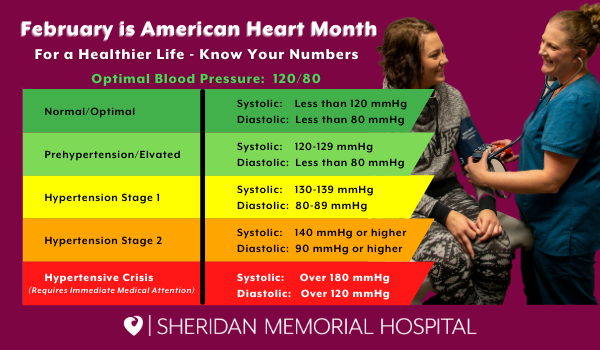By Kristi Ramsey, RN, BSN, RCIS, CVRN – Sheridan Memorial Hospital Cath Lab Manager
Did you know that nearly 1 in 2 Americans have high blood pressure and many people don’t even know they have it? That’s because there are often no warning signs. Having high blood pressure (also called hypertension) makes a stroke or heart attack much more likely.
High blood pressure is the force of your blood moving against the walls of your arteries. So when your blood pressure is too high, your heart is on overdrive. Over time, elevated blood pressure can weaken your heart, blood vessels, kidneys and other parts of your body.
There are many steps you can take to lower your blood pressure. It’s important to work together with your health care team to set your blood pressure goal, the reading you’d like to consistently see when your blood pressure is taken—and how you can best reach it.
We’ve gathered this information from the American College of Cardiology:
Living with High Blood Pressure
The goal of any treatment plan is to prevent or reduce the impact of high blood pressure and the onset of complications, including stroke, heart attack, heart failure and chronic kidney disease.
Lower is Better
Know your numbers! Your healthcare professional may talk with you about setting a “target goal.” A normal blood pressure reading is less than 120/80 mmHg.
Research shows that lower blood pressure goals improve heart health.
Lifestyle Changes are Key
Lifestyle changes are the main treatment for those with elevated or stage 1 high blood pressure. They are also important in treating individuals with stage 2 high blood pressure (>140 mmHG/>90 mmHG) and for good overall health. Healthy choices can go a long way in helping to lower your numbers and include:
- Getting regular physical activity
- Maintaining a healthy body weight
- Focusing on healthy eating (follow the Dietary Approaches to Stop Hypertension diet, limit salt and eat potassium-rich foods)
- Limiting alcohol (no more than one drink per day for women, two drinks per day for men)
- Smoking cessation
It’s important to cut back on the amount of salt (sodium) you consume, particularly if you are already eating a diet that is high in salt. The latest Dietary Guidelines for Americans recommend people consume no more than 2,300 mg of sodium per day—less than a teaspoon of salt. However, for people with high blood pressure or at risk for it, less than 1,500 mg of sodium per day is often the goal.
Stress also can cause your blood pressure levels to spike, so make sure to do things that help you relax and reset. Some examples include: listen to your favorite music, go for a walk, or take a yoga class.
Medications Play a Role
Some common medications used in treating high blood pressure include thiazide-type diuretics, calcium channel blockers, ACE inhibitors, aldosterone antagonists and beta-blockers, which may be considered specifically if the person has coronary artery disease after a heart attack or heart failure. You may need multiple medications, especially if your numbers are significantly above your goal.
It’s critical to take medications exactly as prescribed and report any side effects. Be sure to share a complete list of all the medications you take, including over-the-counter drugs and supplements.
The new guidelines lower the threshold for when treatment is needed. If you’re already being treated for high blood pressure, it’s a good time to review your treatment plan and decide with your care team whether your target blood pressure numbers should be lower. You might need to step up your lifestyle changes or medication, or both.
Track Your Blood Pressure
Tracking your blood pressure is a key part of managing it. Find out how often you should take and keep a record of your blood pressure readings. Having this information in hand can help your health care professional know what is working and when to adjust your treatment plan.
Other conditions, sometimes called secondary causes, might be triggering high blood pressure and should be taken into consideration. These conditions include sleep apnea, chronic kidney disease, certain medications, and adrenal or thyroid disorders.
Talk to Your Care Team
It’s important to talk with your healthcare professional about your blood pressure and any other factors that put you at risk for heart disease. Knowing your numbers can help you take steps to either prevent or lower high blood pressure.
If you don’t have a primary care provider, give our Internal Medicine practice a call at 307.675.2620 and they can set you up with a care team.

